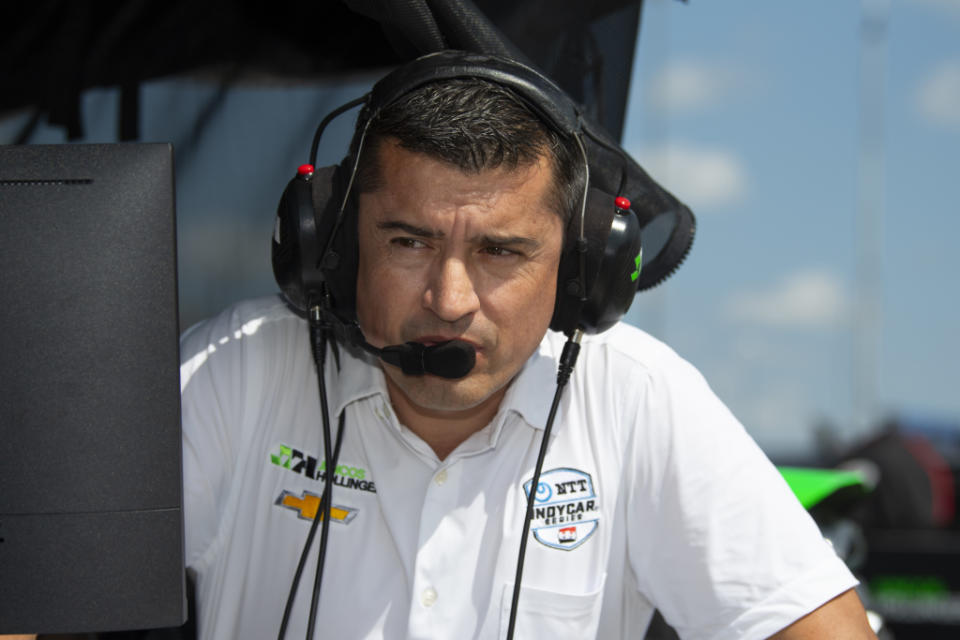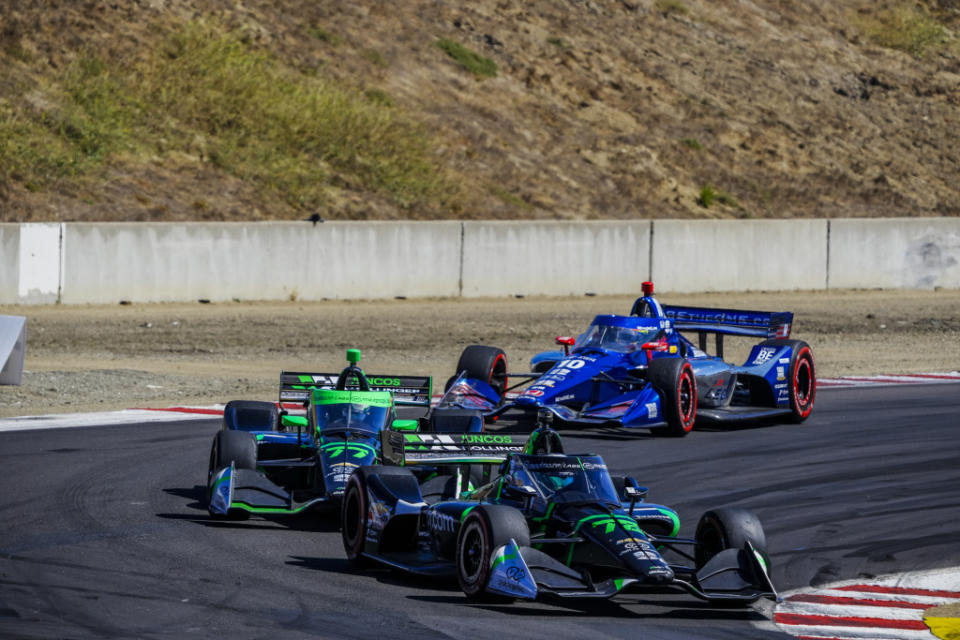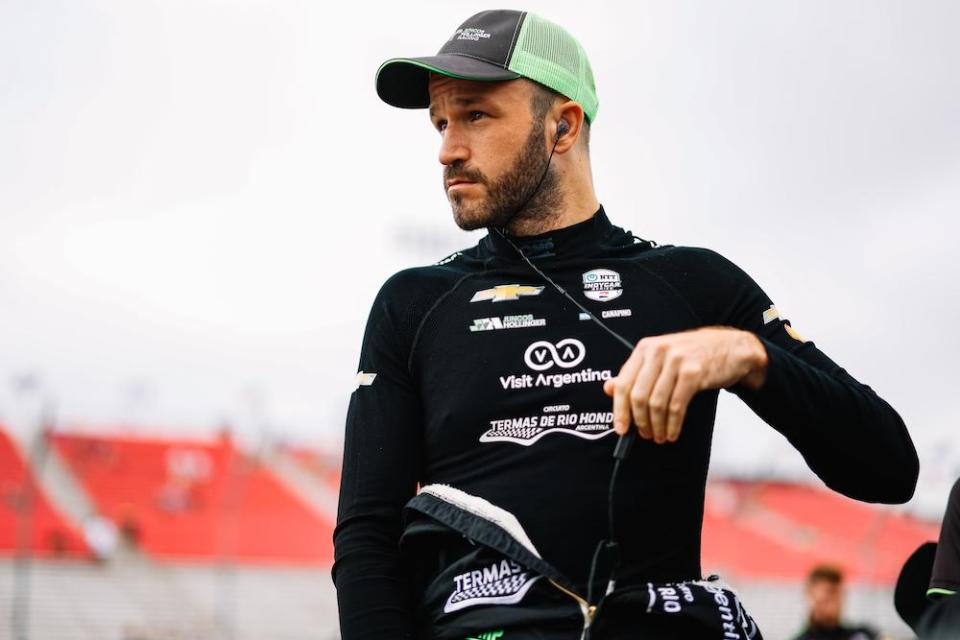Juncos reconsiders Ilott/Canapino clash at Laguna

With a bit of time and distance between the ugly events that took place within the Juncos Hollinger Racing team after drivers Callum Ilott and Agustin Canapino tangled at the Firestone Monterey Grand Prix, team co-owner Ricardo Juncos has taken a fresh look at the situation and come to a few conclusions that are different than the ones he offered moments after the checkered flag waved.
Ilott and Canapino were given clear directives prior to the start of the 95-lap season finale: Race cleanly, which is a standard order in any multi-car team, and specific to Canapino, whose No. 78 Chevy entry was at risk of losing out on earning $910,000 in guaranteed prize money offered to those who place inside the top 22 in entrants’ points, Ilott — whose No. 77 Chevy was safe in that regard — was asked to do whatever he could to help his teammate secure a Leaders Circle contract for JHR.
In multiple interviews to Spanish-speaking outlets, Juncos was initially unflinching in his support of Argentinian countryman Canapino, whose right-front wing was broken from contact with Ilott’s left-rear tire as the Englishman made a pass around the outside of Canapino in Turn 2 near the end of the race. Juncos was also critical of Ilott, who was subjected to another torrent of online abuse from some of his teammate’s fans.
Ilott posted in-car footage immediately after the race that showed he was hit by a sliding Canapino in the No. 78 Chevy, but since then, he has remained silent on the matter, leaving Juncos as the primary voice to provide clarification and insights on a number of topics related to Monterey.
There are a number of ways to look at the clash between the Juncos Hollinger Racing drivers at Laguna, but Juncos is staying focused on the bigger picture. Richard Dole/Motorsport Images
Speaking from Argentina, Juncos answered questions stemming from the heated close to JHR’s season, starting with where he and co-owner Brad Hollinger stand with Ilott for the future.
“My agreement with Callum Ilott is through ’24,” Juncos told RACER. “So like what happened last year when some other teams tried to take him, we have a three-year agreement, so as of now, I don’t see why he will not continue.”
JHR plans to confirm its entire lineup in December, and hopes to find the funding to bring Canapino back for his sophomore season.
“The problem is obviously on the last weekend, and all these social media attacks on Callum that obviously magnified the whole situation,” Juncos continued. “But it has no effect at all in my decision to continue with him.”
Among a decent number of those who blamed Ilott and went on the offensive after the race, there was a strong belief he violated an order to not pass Canapino, and was therefore at fault for the contact and damage to the No. 78 car that fell from fifth to 14th. Juncos says that order was never given to Ilott.
”No, absolutely not,” he said. “The only comments we did to the group is that we as a team are trying to get inside the top 22 with Agustin because he was fighting with Andretti and some other guys to get the last Leaders Circle. Second of all, we never ever sent this notice to don’t pass each other. Actually, Agustin, through the whole year, was letting Callum go by every time and he knows he’s a rookie and Callum is the top driver, the number one driver.
“It was a shame they touched with 20 laps to go, so the only thing I said as a team owner is you don’t want to see your cars hitting each other. We say that all the time. But we never say to Callum that you cannot pass Agustin. That’s totally false.”
With Canapino’s closest Leaders Circle rivals mired in lap 1 incidents, the No. 78 Chevy was in good standing to deliver a contract to JHR. Canapino was the star of the race — running as high as fourth — while showing front-running pace as he battled with drivers representing IndyCar’s biggest and most successful teams. In the end, he captured 21st in the entrants’ championship.
Referring to the in-car footage of the contact between his drivers, Juncos absolved Ilott of any blame, but did ask if there was a better place the overtake could have been executed.
“Obviously, if you isolate that move, it’s Agustin’s fault,” Juncos said. “But the problem is Agustin never thought that Callum is going to go outside [around Turn 2] to do the pass. He couldn’t believe that from his point of view — Callum had 22 laps to pass Agustin on the straightaway if he wants to, and Agustin was saving fuel, so there was no way he was going to hold Callum’s pace. So in his mind, the pass is gonna be easy, but then it does catch him by surprise. But if you look at the maneuver, it’s Agustin’s fault.”
Juncos also spoke to the lack of intent he saw from the in-car footage.
“Nobody tried to hit each other,” he continued. “Callum doesn’t mean to hit Agustin, and Agustin didn’t mean to hit Callum. And I never said that. If anybody sees the onboard camera, that’s very clear. The only thing I said as a team owner was we should not be risking between the two drivers who are in such a good place for the team. I expect my drivers to think about the team.”
Asked if the temperature within the team has cooled since Monterey where the No. 77 and No. 78 camps split and had limited communication in the hours following the race, Juncos said, “The team is fine.”
Juncos thinks it’s hard for Americans to fully comprehend the fan support of Canapino in Argentina, which sometimes gets lost in translation. Joe Skibinski/Penske Entertainment
Next, Juncos opened the door on a long and weaving narrative that centered on cultural differences between IndyCar’s English-speaking audience and its Spanish-speaking fans from Argentina.
It would be accurate to say the team’s late and lukewarm rebuke of those who put Ilott in their social media crosshairs was a byproduct of differing views on how online aggression should be perceived.
“Obviously, we need to talk between all the parties together, face to face,” Juncos said. “And that didn’t happen [in the days after the race] because I went right away to Argentina. So [JHR’s drivers] need to sit down and talk and explain what happened, both of them. I spoke with Callum by phone and I understand his point of view; I agree with some and then he agreed with the risk factor that I was complaining about. He apologized for that because he was the one attacking and he generated the risk for the situation where maybe both cars can be out of the race.
“And that wasn’t a necessary risk at that time of the race, in my opinion. He agrees with that. But we need to sit down and normally these things happen [between teammates] all the time with every team. I don’t know why it’s such a big deal with us.”
Juncos reiterated a point he’s made a few times since the first attack on Ilott took place after Long Beach in April: The backlash, while undesirable and unpleasant, isn’t out of the norm for what he’s grown accustomed to seeing at home among fans of soccer, motor racing and other sports.
“Listen, the social media needs to be taken as social media,” he said. ”You know how much junk is on Twitter? When in Argentinian language and culture they say something in Spanish, and you translate that in English, it’s taken in totally the wrong way. We put the statement out to calm the waters down, and it’s been attacked even more because they say we did this in a soft way, and it was later than it should be and all that.
”I don’t think we need to make a big deal. This happens. The drivers can have the option not to use social media, to block the comments if they’re going to be sensitive to all that.”
Juncos points to misinterpretation as an underlying problem that’s exacerbated the issue.
“The translation is a problem because there is a passion from the 45 million people here in Argentina,” he said. “And this guy, Agustin, unfortunately, like it or not, he’s a hero here in a country where people tattoo his name on their body and give their child the name of Agustin. He’s a big deal, right? But if you let it go, it’s fine.
“And if this [contact] happened with Pato O’Ward from Mexico, it’s gonna have the same [reaction], right? But 20 idiots saying something bad, which obviously I’m not in favor of that at all, cannot be more powerful than all the good things that we did.
“Imagine a Brazil-Argentina soccer match, or Liverpool in England…it’s not just the Argentinian people who says these things. If a guy is angry for whatever reason, we should not respond because we need to be smarter than that. So that’s what we need to analyze.”
He also recognizes that at least within IndyCar’s U.S. fan base, targeted social media hate and threats focused on a driver or team is anything but common.
“We are mixing cultures, which can be dangerous,” Juncos said. “I try to tell people here, the IndyCar fans, to be careful, because the way we act and show our passion doesn’t exist in other places. That’s not normal and it’s hard for them to understand. This has obviously damaged us in a way. And I agree, we need to talk to IndyCar and have a plan. So we are gonna do our part, gonna listen, and try to do our best to learn from this.”

 Yahoo Autos
Yahoo Autos 

